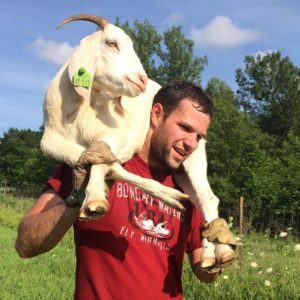Help grow the power of the PFI community. Donate today.
Salud y Manejo de Cabras
El Ciclo de una Operacion con Adam: Salud y Manejo de Cabras
Jueves 11 de julio | 10 a.m. – Mediodía
1803 310th Ave. | Chelsea, IA 52215
Anfitron
Adam Ledvina
Para registrarse, llame o mande un mensaje al (515) 232-5649.
Adam pastorea sus cabras en múltiples secciones de tierra en el condado de Tama y más allá. Muchas de estas granjas se consideran altamente erosionables. Como resultado, lo que no es adecuado para los cultivos en hilera se destina a pastos, heno y programas de conservación. Estas granjas consisten en diversos paisajes, que incluyen praderas, sabanas de robles, pastizales de estaciones frías y cálidas, humedales, bosques boscosos montañosos y bosques ribereños a lo largo de los afluentes del río Iowa. Hace diez años, esta tierra consistía en un 50% de cultivos en hileras y casi un 50% de acres en barbecho. Ahora, estas granjas se están utilizando en todo su potencial para apoyar la ganadería, la vida silvestre y la conservación.
Comida
Una comida se servira despues del evento.
Ver & Discutir
- Salud general
- Biología y manejo caprino
- ¿Qué debe haber en su botiquín?
- Artículos que debes tener a mano
Notas de Ubicacion
Busca “Iowa Kiko Goats” en Google Maps.
Anfitron Datos
Patrocinador
Premier 1 Supplies
Year in the Life With Adam: Goat Health & Management
Thursday, July 11 | 10 a.m. – Noon
 Location
Location
1803 310th Ave. | Chelsea, IA 52215
Host
Adam Ledvina
This is a Spanish interpreted event. To register: please contact Valeria at 515-232-5661 or valeria.cano.camacho(at)practicalfarmers(dot)org.
Adam grazes his goats on multiple sections of land across Tama County and beyond. Many of these farms are considered highly erodible. As a result, what is not suitable for row crops is put into pasture, hay and conservation programs. These farms consist of diverse landscapes, including prairie, oak savannas, cool- and warm-season grasslands, wetlands, hilly woodland forests and riparian forests along tributaries of the Iowa River. Ten years ago, this land consisted of 50% row crops and nearly 50% fallow acres. Now, these farms are being used to their fuller potential to support livestock, wildlife and conservation.
Meal
A meal will follow the field day. To reduce waste, please bring your own reusable table service.
See & Discuss
- General health (Salud general)
- Goat biology and management (Biología y manejo animal)
- What should be in your medical kit (Botiquín de emergencias)
- Items to have on hand (Artículos a tener a mano)
Location Notes
Search “Iowa Kiko Goats” on Google Maps.
Farm Info
Sponsor
- Premier 1 Supplies
Special Instructions for Visiting Farms With Livestock
We ask that all attendees at field days where livestock are present observe the following biosecurity practices. While biosecurity is important on all farms, clean shoes and clothes are particularly important due to the presence of highly pathogenic avian influenza (HPAI).
When visiting farms with livestock, we ask that attendees:
Wear clean shoes or boots that have not been worn on other farms with livestock or livestock buildings, or around a dense population of wild birds. If shoes or boots were worn around livestock or birds, they must be cleaned and disinfected.
Wear clean clothes that have not been worn around other livestock.
Upon request of the farmer host or PFI staff during the field day, you may be asked to disinfect shoes or boots in a phenol or similar solution or wear disposable plastic boot covers over your shoes (provided by PFI).
